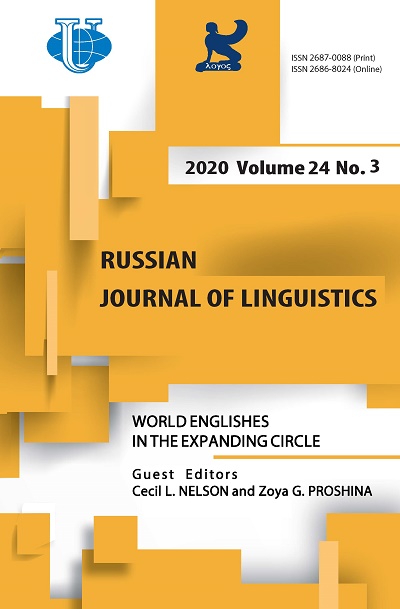World Englishes and learner lexicography: View from the Expanding Circle
- 作者: Lovtsevich G.N.1, Sokolov A.A.1
-
隶属关系:
- Far Eastern Federal University
- 期: 卷 24, 编号 3 (2020): World Englishes in the Expanding Circle
- 页面: 703-721
- 栏目: Articles
- URL: https://journals.rudn.ru/linguistics/article/view/24407
- DOI: https://doi.org/10.22363/2687-0088-2020-24-3-703-721
如何引用文章
全文:
详细
This article analyzes a World Englishes paradigm shift in four monolingual English-language learner’s dictionaries designed to meet the reference needs of people learning English as a non-native language in the Expanding Circle. The study investigates the question of how modern learner’s dictionaries reflect the current global status of English. The dictionary focus on educational learner needs exclusively seems to ignore the today’s range and depth of the socio-cultural functions of global English. The authors examine the dictionaries’ coverage of non-Inner Circle varieties of English and, in particular, analyze culture-loaded borrowings from Northeast Asian countries (China, Japan, Korea, and Russia) where English is widely used for intercultural communication. The particular interest is in the way the dictionaries define such entries and represent non-English cultures and identities of their speakers from the Expanding Circle through borrowings. Analysis of the wordlists of learner’s dictionaries reveals an ethnocentric approach in compiling the dictionaries. This is manifested both in the patchy coverage of non-Inner Circle varieties of English in the dictionaries and in the inexplicable selections of borrowings to be included. Words associated with the Northeast Asian countries tend to be selected arbitrarily and according to Western rather than regional culture priorities. Anglocentricity is also evident in the definitions of the headwords related to Northeast Asia. The majority of the borrowings are defined in British or American terms without any perspective of the culture from which the words arise. The authors conclude that the representation of non-English cultures in learner’s dictionaries is ideological and ethnocentric and therefore cannot meet the challenges of the globalized world.
作者简介
Galina Lovtsevich
Far Eastern Federal University
编辑信件的主要联系方式.
Email: lovtsevich.gn@dvfu.ru
Doctor of Philology (Habil.), Head, Department of Linguistics and Intercultural Communication
8 Sukhanova St., Vladivostok, Russia, 690091Alexander Sokolov
Far Eastern Federal University
Email: sokolov_aa@dvfu.ru
Postgraduate Student, Department of Linguistics and Intercultural Communication, Institute of Oriental Studies - School of Regional and International Studies
8 Sukhanova St., Vladivostok, Russia, 690091参考
- Benson, Phil. 2001. Ethnocentrism and the English Dictionary. London: Routledge.
- Bogaards, Paul. 1996. Dictionaries for learners of English. International Journal of Lexicography 9 (4). 277-320.
- Chen, Wenge. 2019. Towards a discourse approach to critical lexicography. International Journal of Lexicography 32 (3). 362-388.
- Cowie, Anthony P. 1995. The learner’s dictionary in a changing cultural perspective. In Braj B. Kachru & Henry Kahane (eds.), Cultures, Ideologies, and the Dictionary: Studies in Honor of Ladislav Zgusta, 283-295. Tübingen: Max Niemeyer Verlag.
- Cowie, Anthony P. 2000. English Dictionaries for Foreign Learners: A History. Oxford: Oxford University Press.
- Crystal, David. 2012. English as a Global Language. 2nd edn. Cambridge: Cambridge University Press.
- De Schryver, Gilles-Maurice. 2012. Trends in twenty-five years of academic lexicography. International Journal of Lexicography 25 (4). 464-506.
- Herbst, Thomas. 1996. On the way to the perfect learners’ dictionary: a first comparison of OALD5, LDOCE3, COBUILD2 and CIDE. International Journal of Lexicography 9 (4). 321-357.
- Heuberger, Reinhard. 2015. Learners’ dictionaries: History and development; current issues. In Philip Durkin (ed.), The Oxford Handbook of Lexicography, 25-43. Oxford: Oxford University Press.
- Kachru, Braj B. 1996. Opening borders with world Englishes: Theory in the classroom. In Steve Cornwell, Peggy Rule & Toshiko Sugino (eds.), On JALT96: Crossing borders. The proceedings of the 23rd annual JALT international conference on language teaching/learning, Hiroshima, Japan, November 1996, 10-20. JALT, Tokyo.
- Kirkness, Alan. 2004. Three advanced learners’ dictionaries. ELT Journal 58 (3). 294-300.
- Kramsch, Claire. 2014. Teaching foreign languages in an era of globalization: Introduction. The Modern Language Journal 98. 296-311.
- Kumaravadivelu, Bala. 2012. Individual identity, cultural globalization, and teaching English as an international language: The case for an epistemic break. In Lubna Alsagoff, Sandra Lee Mckay, Guangwei Hu & Willy A. Renandya (eds.), Principles and Practices for Teaching English as an International Language, 9-27. New York: Routledge.
- Lambert, James. 2019. Lexicography and World Englishes. In Daniel Schreier, Marianne Hundt & Edgar W. Schneider (eds.), The Cambridge Handbook of World Englishes, 408-435. Cambridge: Cambridge University Press.
- Lee, William R. 1989. The treatment of pronunciation in some (mainly British) monolingual general dictionaries used by learners of English. In Makhan L. Tickoo (eds.), Learners’ Dictionaries: State of the Art, 112-123. Singapore: SEAMEO Regional Language Centre.
- Lovtsevich, Galina N. 2019. Teaching English as a language of international communication: Time of change. The Humanities and Social Studies in the Far East 16 (1). 135-142.
- McKay, Sandra L. 2012. Principles of teaching English as an International Language. In Lubna Alsagoff, Sandra Lee McKay, Guangwei Hu & Willy A. Renandya (eds.), Principles and Practices for Teaching English as an International Language, 28-46. New York: Routledge.
- Proshina, Zoya G. 2019. Elaborating on the Expanding Circle. World Englishes 38 (1-2). 233-244.
- Sterkenburg, Piet van. 2003. A Practical Guide to Lexicography. Amsterdam: John Benjamins.
- Whitcut, Janet. 1995. Taking it for granted: Some cultural preconceptions in English dictionaries. In Braj B. Kachru & Henry Kahane (eds.), Cultures, Ideologies, and the Dictionary: Studies in Honor of Ladislav Zgusta, 253-257. Tübingen: Max Niemeyer Verlag.
- Aadhaar, dabba, hartal, shaadi make it to Oxford dictionary. India News - Times of India [Electronic resource]. URL: https://timesofindia.indiatimes.com/india/aadhaardabba-hartal-shaadi-make-it-to-oxford-dictionary/articleshow/73584050.cms (accessed: 06 March 2020)
- Cambridge Advanced Learner’s Dictionary [Electronic resource]. URL: https://dictionary.cambridge.org/dictionary/english/ (accessed: 18 April 2020).
- Collins COBUILD Advanced Learner’s Dictionary [Electronic resource]. URL: https://www.collinsdictionary.com/dictionary/english (accessed: 18 April 2020).
- Hornby, Albert S. & Sally Wehmeier (eds.). 2000. Oxford Advanced Learner’s Dictionary of Current English. 6th edn. Oxford: Oxford University Press. (accessed: 18 April 2020).
- Longman Dictionary of Contemporary English [Electronic resource]. URL: https://www.ldoceonline.com/ (accessed: 18 April 2020).
- Oxford Advanced Learner’s Dictionary [Electronic resource]. URL: https://www.oxfordlearnersdictionaries.com/ (accessed: 18 April 2020).














